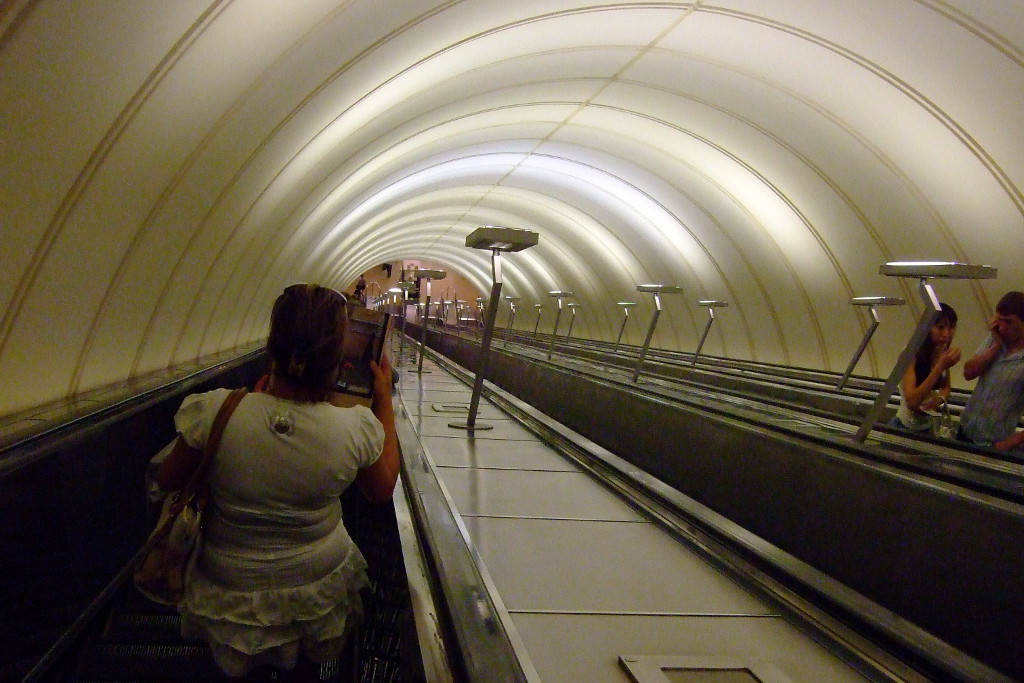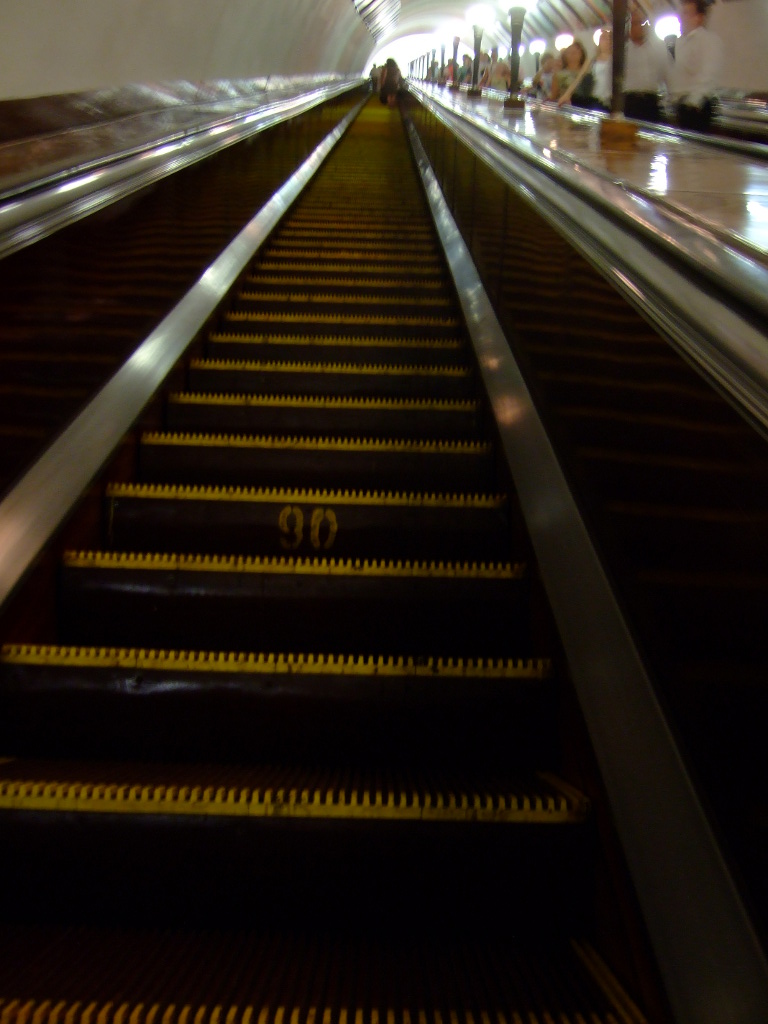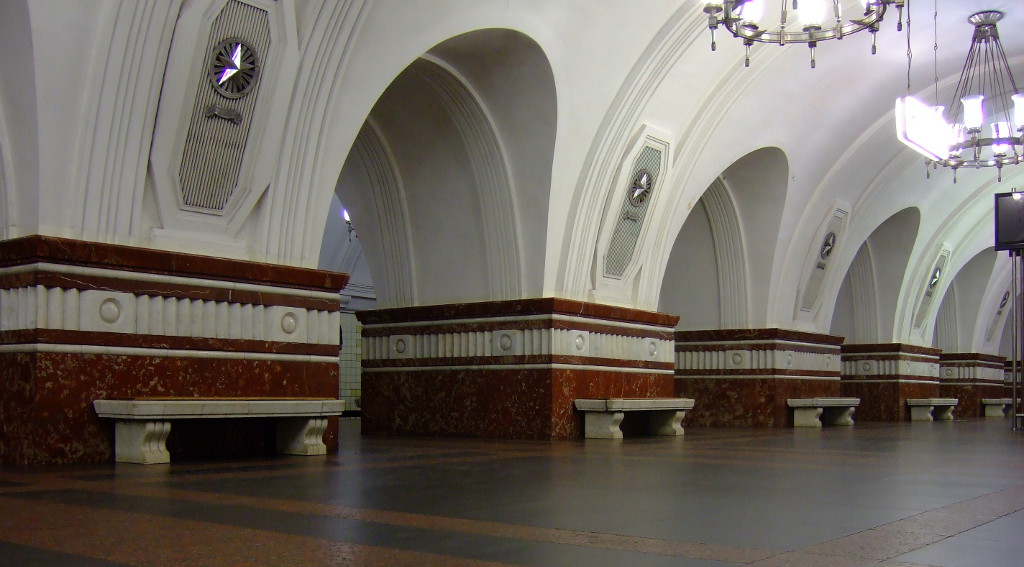.
Though it was hardly four in the morning when the Czech Lines’ airplane landed, dawn was already faintly breaking over the horizon. Moscow Sheremetyevo airport was barely awakening. To my surprise, the border-crossing procedure was much easier than what my former Russian experiences had made me expect. “This country –thought I– is not the shade of what it was: they no longer make you wait at the migration booths!” My suitcase, though, emerged from the baggage conveyor quite damaged: three supports lost, the mainstay broken, the main strap unfastened, and showing a few severe scratches all over. Luckily I didn’t pack the wine bottles I had thought of bringing, because the bag seemed not only ill handled, but also meanly treated. Too bad it’s not possible–even if only for narrowing down the discredit–to find who is the damage to be attributed: whether Barajas’ operators, Prague’s, Moscow’s or all alike. Sure, I understand that being a package handler is, perhaps, one of the least exciting jobs in our society; but those guys, for the purposes of entertaining themselves or venting their frustrations, rather than kicking the baggage, couldn’t they kick each other’s balls instead? Whatever…
As usual, for reaching the city at this early hour there is no other transportation means than the taxis; and that’s why half of the people in, or around, the airport terminal are neither passengers, nor airport employees, but taxi drivers (or go-getters) in search for travelers (or victims). Also –I was told– there are, from a not far away station, express trains which, for 500 rubles, link the city with the airport. But, in my insane desire for minimizing travel expenses, I opted for something drastically cheaper: the normal bus routes (#851 and #817) which, for only 28 rubles, will take you to the end of some subway line, where from you can finally reach almost any other spot in the great metropolis. The main drawback of these regular buses is that they don’t start running until 6 am; therefore, I had to wait for them almost two hours on a bench outside the terminal, as there is nowhere to sit down inside; and yet I was lucky to find a place in this bench!: other people who came afterwards had to wait standing. Fortunately it wasn’t cold.
When the bus finally arrived, it was already half full with passengers from the other terminals; and since, by then, there were quite a few low-cost travellers gathering around the bus stop bench, I was very lucky (or so I thought) to have the coach doors opened right in front of me, so that, once on board, I was able to take the only empty seat left: at the very end of the coach, between an overheated bulkhead and a guy who hadn’t seen a shower for a month, and whose clothes, indisputable brownish, had the faint shine, the colour of a fly’s wing, characteristic of the dirt tissue excessively handled. Not that this lack of hygiene on the part of my neighbor bothered me much, but it turned out that, with the heat coming from the bulkhead and underneath our sits, all that man’s filth reached the fermentation point and emanated nauseating vapors which kept me on the verge of puking for half an hour. But I had no escape, because on the landing right ahead of me a big traveler had improvised a seat on a heavy suitcase, thus forming an impassable barrier that forced me to stay where I was, doomed to my own luck until the end of the traject: Rechnoy Vokzal metro station.
The Moscow tube–deep, intricate and extensive–is a pharaonic engineering work. The escalators leading to the tunnels, as seen from the top, fade down there in a conical perspective of dizzy slope; and they’re so long that it takes ages to reach the end; an almost distressing feeling, as when descending down the shaft of a mine. The metro stations have a single central platform, the tracks running on both sides. They’re roomy and vaulty, sometimes majestic, and long: capable for the eight-car trains that, in an almost frantic succession, travel loud and shaky the undergrounds of Moscow. On a map, the subway lines ramify and extend as dendrites, near whose ends the stops are so far away from each other that, in some cases, you can take a good nap while covering the distance between them. And so i did: dozing in the half empty car as we progressed through the endless galleries, I imagined the city as moving above me at a sidereal speed, like if it was a fabulous electrical circuit whose nodes the train connected while running along the rails. This way I could mentally gauge Moscow’s huge dimensions. When, at last–twelve stations and two transfers later–I emerged to the surface again, the sun tinted in yellow the east sides of the buildings.
This was the third beltway of the city: a two-levelled, wide and noisy crossing of two main avenues carrying a busy and incessant traffic. My destination was close by: an apartment block of the communist style, parallelepiped, built with initially white brick that now was dirty and grey from the smoke of millions of vehicles. Beyond the shoddy and blind wooden gate, the tiny doorway welcomes me with its grim smile of half opened, pale green mailboxes showing their holes like a toothless mouth. The landings are paved with yellowish broken tiles, heavily patched; the grey steps are dirty and worn. The doors of the apartments are plain, and armoured like prison cells. Behind one of them appears Masha’s smile. A long hug, some kisses, a shower and a well deserved rest…



..
Cuando el avión de la Czech Airlines aterrizó eran apenas las cuatro de la madrugada, pero las primeras luces del alba asomaban ya por el horizonte. El aeropuerto de Moscú Sheremetyevo apenas se desperezaba y el trámite fronterizo, para mi sorpresa, fue mucho más ágil de lo que mis anteriores experiencias rusas me habían permitido predecir. “Este país –pensé– ya no es lo que era: ni siquiera lo hacen esperar a uno en las cabinas de migración.” Mi maleta, eso sí, emergió del carrusel de equipajes en un estado bastante ruinoso, con tres patas de menos, el apoyo principal roto, la cincha suelta y unos cuantos rasguños. Suerte que no metí en ella las botellas de vino que había pensado traer, porque presentaba los síntomas de haber sido tratada no ya con total negligencia, sino incluso con saña. Lástima que no sea posible, siquiera por acotar el descrédito, determinar a quién ha de atribuirse el daño: si a los operarios de Barajas, a los de Praga, a los de Moscú… o a todos ellos por igual. Y no es que yo no comprenda que el oficio de estibador es, tal vez, uno de los menos apasionantes que puedan ejercerse en nuestra sociedad; pero digo yo que, para buscar entretenimiento y diversión esos tíos, o para desahogar sus frustraciones, en lugar de liarse a patadas con los equipajes, ¿no podían patearse los cojones unos a otros? En fin…
Como es normal, para llegar hasta la ciudad a esas horas no hay más medio de transporte que el taxi, y enseguida se le hace patente al recién llegado que una buena mitad de las personas que se ven por la terminal no son ni pasajeros, ni trabajadores, ni empleados aeroportuarios, sino taxistas o, lo que es igual, buscavidas en busca de cliente, cuando no de víctima. Hay también, al parecer, unos trenes exprés que, desde una estación no lejana, enlazan el aeropuerto con la ciudad por 500 rublos. Pero yo, en mi insano afán por reducir al máximo los gastos de viaje, opté por un medio drásticamente más económico: los autobuses de línea normales (el 851 y el 817) que, por tan sólo 28 rublos, te llevan hasta el extremo de una u otra línea de metro desde donde, al mismo precio, puedes ya alcanzar, prácticamente, cualquier otro punto de la gran metrópolis.
El principal inconveniente, en mi caso, de dichos autobuses regulares era que no empezaban a circular hasta las seis, de manera que me tocó esperar casi dos horas en un banco a la intemperie, ya que dentro del aeropuerto no hay lugar alguno donde sentarse; ¡y aún puedo dar gracias a que hallé un lugar donce hacerlo!, pues quienes llegaron después hubieron de aguardar de pie. Por suerte, además, a causa del calentamiento global no pasé frío alguno durante la espera. Cuando al fin llegó el autobús, venía ya medio lleno de las otras terminales; y como para entonces nos habíamos juntado, en la parada, una buena cantidad de viajeros de los de bajo presupuesto, fue una gran suerte (o al menos eso creí al principio) que el conductor abriese las puertas justo frente a donde yo me situé, pues esto me permitió ocupar el único asiento vacío que quedaba: al final del todo, entre la caja recalentada de la maquinaria auxiliar y un fulano que no había visto una ducha en un mes y cuyas ropas, de un indiscutible color pardo, tenían el tenue brillo “ala de mosca” característico del tejido que, a medida que se manosea, ha ido haciendo cuerpo con la mugre. Y no es que esta falta de higiene del próximo prójimo me incomodase mucho, pero resultó que, con el calor que emanaba la maquinaria del autobús junto y bajo nuestros dos asientos contiguos, toda aquella mierdecilla alcanzaba el punto de fermentación y emanaba vapores nauseabundos que me tuvieron a punto del vómito durante la media hora larga que duró el trayecto. Además, por desgracia, no tuve escapatoria posible, ya que justo delante de mí un corpulento viajero había improvisado un asiento sobre su pesada maleta, formando entre ambos una infranqueable barrera que me imposibilitaba cualquier cambio de ubicación; de manera que resulté condenado a mi propia suerte hasta el final: la estación de metro Rechnoy Vokzal.
El metro de Moscú, profundo, intrincado y extenso, es una faraónica obra de ingeniería. Las escaleras mecánicas que bajan hasta los túneles se pierden allá al fondo en una perspectiva cónica de vertiginosa pendiente; y el tránsito en ellas se eterniza, casi angustioso, como por el pozo de una mina. Las estaciones, con andén central y vías laterales, son espaciosas, de altas bóvedas; a veces majestuosas; y largas, capaces para los trenes de ocho vagones que estrepitosos recorren, en una sucesión casi frenética, el subsuelo de Moscú. Sus líneas se ramifican y alargan como grietas en un muro, o como dendritas, cerca de cuyos extremos las paradas se alejan tanto entre sí que, en algunos casos, el tren puede tardar hasta cinco minutos en salvar la distancia que las separa. Yo, dormitando en el vagón medio vacío mientras avanzaba por las interminables galerías, me imaginaba a la ciudad desplazándose sobre mí a una velocidad sideral, como si fuera un fabuloso circuito cuyos nudos iba el tren conectando a su paso por los raíles, y calibraba mentalmente sus enormes dimensiones. Cuando por fin, doce estaciones y dos trasbordos más tarde, emergí de nuevo a la superficie, aún me hallaba en el tercero de los anillos de Moscú, a cinco kilómetros del centro según vuela el cuervo. Se trataba del ancho y ruidoso cruce a dos niveles de sendas arterias recorridas por un tráfico incesante.
El sol teñía ya de amarillo las fachadas laterales de los edificios. No me costó trabajo encontrar el mío: un bloque de pequeños apartamentos al estilo comunista, paralelepípedo, de ladrillo visto que algún día fue blanco y ahora aparecía sucio y gris por el humo de millones de vehículos. El minúsculo portal me da la bienvenida con su macabra sonrisa verde pálido de buzones entreabiertos, que muestran sus huecos como la boca de un desdentado. El rellano es de terrazo amarillento y roto, los peldaños de piedra artificial aparecen sucios y gastados. Las puertas de los apartamentos son ciegas y blindadas, como las celdas de un penitenciario. Tras una de ellas aparece la sonrisa de Masha. Un largo abrazo, unos besos, una ducha y un merecido descanso…



.

A long and exhausting journey for international love. And yet you still find time to write a detailed blog in two languages. Interesting. In fact, as interesting as a person with two jobs finding time to comment on a blog.
But when commenting on a blog, don’t you feel the pleasure of writing, the joy of communication? Isn’t it as enjoyable as working, if not more? Shouldn’t we try to find a balance in life, where there’s a moment for everything? Shouldn’t we try to evenly stow the stuff in our lives, instead of everything on the port or the starboard side?
Balancing acts are for circus performers. lol